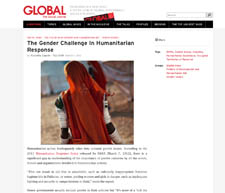March 7, 2012
Source: The Global Journal
 Humanitarian action inadequately takes into account gender issues. According to the 2011 Humanitarian Response Index released by DARA (March 7, 2012), there is a significant gap in understanding of the importance of gender concerns by all the actors, donors and organizations involved in humanitarian actions.
Humanitarian action inadequately takes into account gender issues. According to the 2011 Humanitarian Response Index released by DARA (March 7, 2012), there is a significant gap in understanding of the importance of gender concerns by all the actors, donors and organizations involved in humanitarian actions.
“This can result in aid that is unsuitable, such as culturally inappropriate feminine hygiene kits in Pakistan, or worse, putting women and girls in danger, such as inadequate lighting and security in campo latrines in Haiti,” reads the report.
Donor governments usually include gender in their policies but “it’s more of a ‘tick the box’ approach,” Fernando Espada, field research manager of DARA, told The Global Journal.
The findings of the survey, covering 23 of the world’s donor countries and nine major crises, show that funding is not always allocated towards projects supported by an adequate gender analysis and that there is insufficient attention to the monitoring and follow-up phase. The lack of sustained commitment of donors in the assessment phase results in missed opportunities to prevent and to prepare to recover effectively from future crises.
The situation in occupied territories of Palestine (ocP) is an example that summarizes the challenges in assessing effective humanitarian assistance. The response to this highly politicized crisis is mainly focused on addressing short-term needs. Despite an increased awareness among humanitarian workers, gender issues ought to be seriously addressed in this part of the world. According to the UN Gender Task Force in Gaza, there is an increased level of domestic violence, worsened by the psychological stress and traumatic effects of the war. The report adds that “more attention should also be given to issues disproportionately affecting women, such as displacement by housing demolitions and evictions”.
“Identifying and addressing these distinct needs enhances humanitarian programming and puts participation of everyone in the affected population and accountability by humanitarian [agencies] for their actions to women, girls, boys and men affected by crisis centre stage,” commented Valerie Amos, Under-Secretary-General for Humanitarian Affairs & Emergency Relief Coordinator.
DARA is an independent organization committed to improving the quality and effectiveness of aid for vulnerable populations suffering from conflict, disasters and climate change.
Share this